The site, located in Delbrück-Bentfeld, boasts at least three distinct Roman farmsteads and ancient artifacts like coins, knives, and pottery shards.
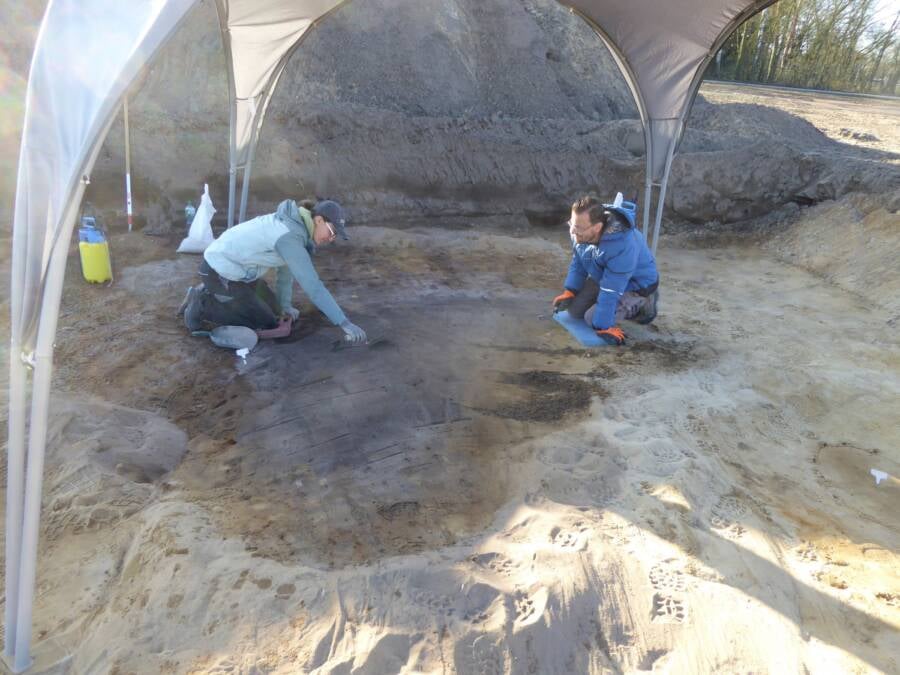
S. Spiong/LWLArchaeologists excavating a pit at a Roman farmstead in Delbrück-Bentfeld, Germany.
In northwestern Germany, the locality of Delbrück-Bentfeld in the district of the city of Paderborn has recently become the site of several groundbreaking discoveries about ancient Roman history.
In 2017, archaeologists uncovered remnants of a Roman farmstead in the area. It was initially believed to be an isolated site, so an excavation was conducted at the farmstead and the discovery was largely forgotten afterward. But by 2024, researchers had revisited the site and uncovered other similar ancient farmsteads, pointing to the existence of a substantial Roman settlement about 90 miles beyond the Roman Empire’s borders.
The ongoing excavation has revealed a fascinating variety of artifacts, including knives, jewelry, and ceramic fragments, which highlight the cultural exchange between the Romans and the local populations.
Uncovering A Roman Settlement Beyond The Empire’s Borders
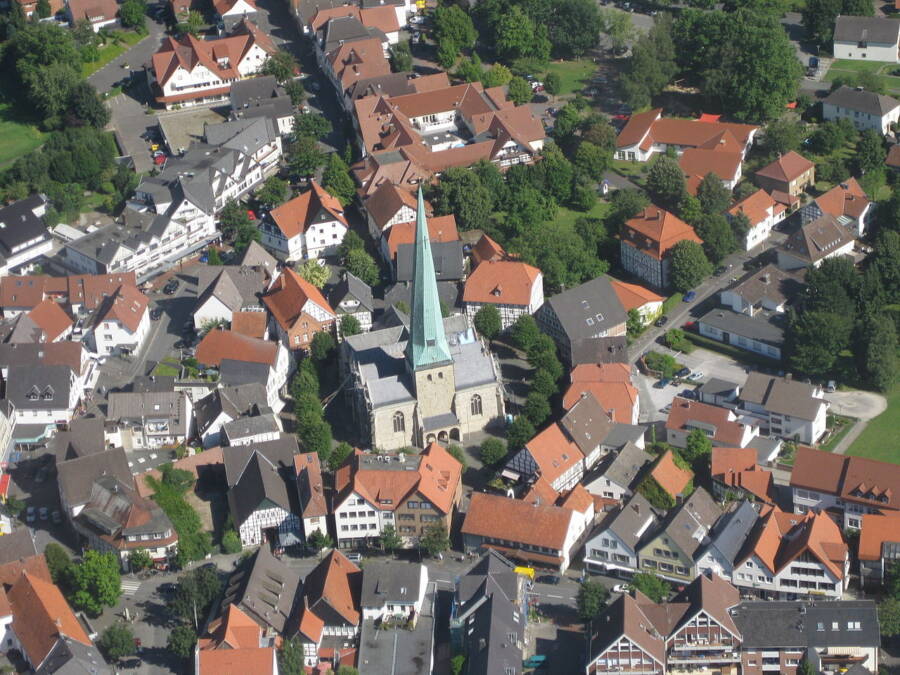
Public Domain The town center of Delbrück in Germany.
In 2017, evidence of an ancient Roman farmstead was discovered in Delbrück-Bentfeld, Germany. At first, most researchers assumed that it was a lone site occupied by a small Roman group, but recent findings point to it being part of a more extensive settlement.
The site, inhabited between the first and third centuries C.E., is located 90 miles from the Limes Germanicus, a series of Roman fortifications that marked the end of the Roman Empire’s territory in the area. The nearby Anreppen camp briefly housed Roman soldiers before it was abandoned following the Battle of the Teutoburg Forest in 9 C.E.
Historians believed most Romans stationed there returned home. However, recent excavations in Delbrück-Bentfeld suggest that at least some of them stayed behind, creating a settlement and intermixing with local cultures.
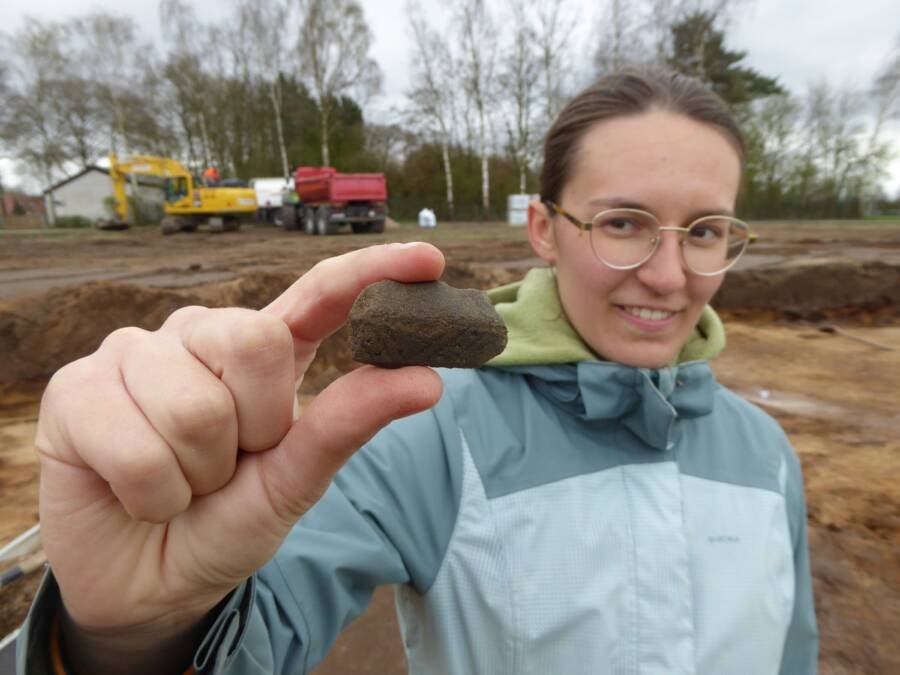
S. Spiong/LWLLea Rokus, a student and excavator, holds an ancient pottery shard discovered at the site.
Since November 2024, archaeologists supervised by the Regional Association of Westphalia-Lippe (LWL) have uncovered three distinct Roman farmsteads in Delbrück-Bentfeld, complete with residential buildings and courtyards.
Examining Ancient Artifacts Left At The Roman Farmsteads In Delbrück-Bentfeld
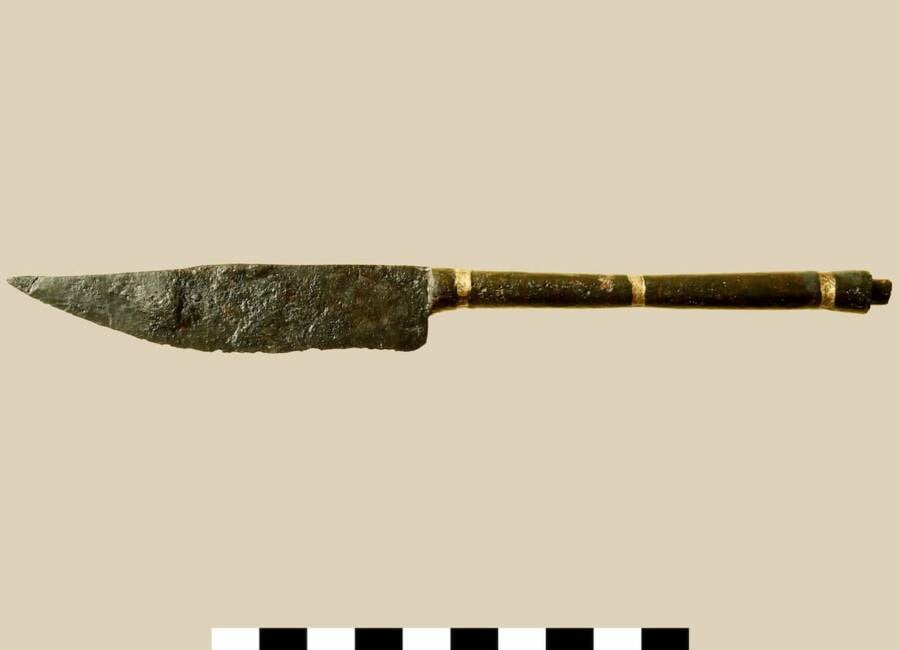
A. Madziala/LWLA nearly eight-inch-long knife with inlaid brass stripes was discovered buried under the floor of a building.
Excavations of each of the farmsteads have led to the discovery of several fascinating artifacts, painting a picture of the daily lives of ancient Romans who lived in the far reaches beyond the empire.
In one farmstead, researchers have unearthed the remains of a kiln containing tiled clay and traces of non-ferrous metal. This points to the site being a possible production center for jewelry.
At another farmstead, coins and ceramic materials recovered there date back to the second and third centuries C.E., long after the Roman soldiers abandoned the nearby Anreppen camp. Clearly, the settlers in the area had other reasons to stay, perhaps including a site of textile production.
“The residential building stood in the center of the courtyard, of which numerous former post holes are still visible in the ground, darkened and discolored. At each of the northern and southern edges of the courtyard, the residents had built a small outbuilding sunk into the ground, in which textiles were probably woven,” Sven Knippschild, the leader of the excavation team, stated in a press release from the Regional Association of Westphalia-Lippe.
At yet another farmstead, researchers uncovered a cellar-like structure and a knife that had been buried by one of the settlers. Measuring nearly eight inches long, the blade was wrapped with brass stripes and buried upright.
“Here, someone had buried a completely intact knife with the blade facing upwards. However, it was so deep that it couldn’t have hurt anyone,” explained Dr. Sven Spiong, an archaeologist involved with the excavation.
The knife, believed to have originated from the Roman Empire, may have been buried as part of a ritual offering. However, further excavation and research is needed to confirm this theory.
The Roman knife wasn’t the only fascinating find at the site. While excavating the farmsteads, archaeologists also uncovered a gemstone featuring a depiction of Mercury, the Roman god of travel, commerce, and messengers.
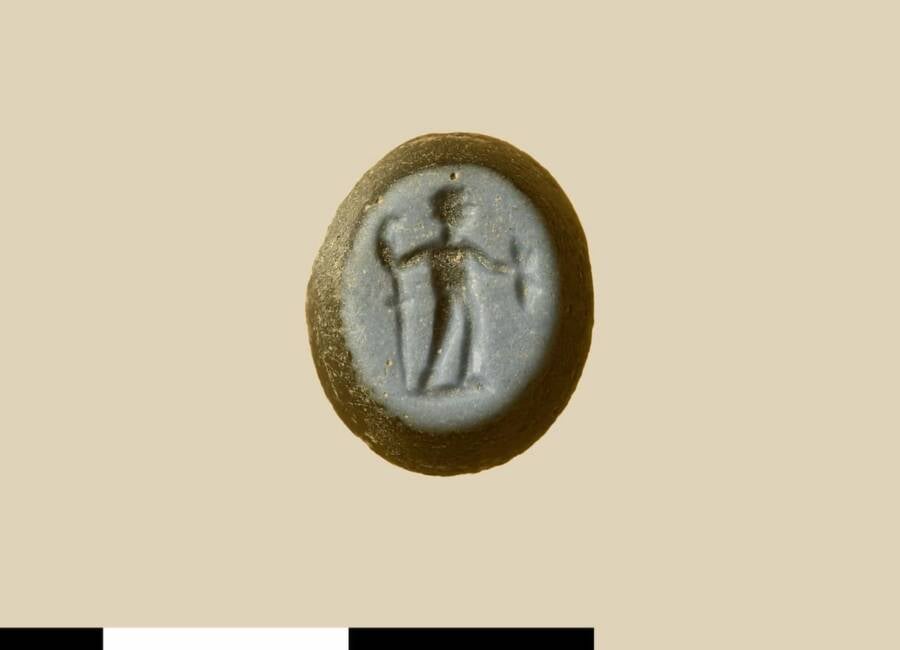
A. Madziala/LWLA small gem with a depiction of Mercury. Researchers believe it was once part of a ring.
These discoveries have not only excited the archaeological community but have also captivated local residents. The findings revealed evidence of extensive Roman activity beyond the empire’s borders, while also highlighting the cultural exchange and integration between the Romans and local populations. This interplay clearly helped shape the region’s history.
“The archaeological excavations… provide us with a unique glimpse into the past. Every find preserves a piece of history for future generations and brings us closer to the world of our ancestors,” said Delbrück’s mayor, Werner Peitz.
After reading about the Roman settlement, dive into the history of the Pax Romana, a period of unprecedented peace in the Roman Empire. Then, read about the most famous gladiators from ancient Rome.





